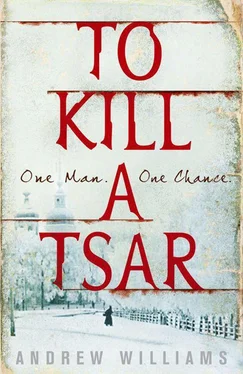Dobrshinsky was always conscious of the peculiar intimacy of their exchanges across the narrow table, within the four grey walls of the cell at ‘the Preliminary’.
Goldenberg began speaking again, of a free vote, free speech, freedom of the press, freedom for labour to organise, things he had spoken of many times already. But the impression the special investigator had formed was of a man who knew nothing of freedom and would always be a prisoner of his past.
When he had finished, Dobrshinsky said quietly: ‘You and I want many of the same things, and there are people close to the emperor who wish to introduce reforms. But there will be no progress until there is an end to violence.’
‘Who wants reform?’ Goldenberg asked.
‘Senior figures, ministers, but they cannot be seen to give in to terrorism. You do see that, don’t you?’
Goldenberg frowned and was on the point of replying, but the special investigator leant forward and raised his hand to stop him. ‘You can play an important part, Grigory Davidovich, you can help your comrades and the people. It will take vision and courage but you can end the violence. You can help save Russia.’
Goldenberg sucked his teeth sceptically. ‘Why should I trust you?’
‘Because we have more in common than you think,’ said Dobrshinsky, leaning forward earnestly. ‘We are both from Kiev — my family came from Poland, so we are outsiders, but educated men. You must see — terrorism will only make the lot of the people harder, believe me, it is killing hope of reform. Russia needs progressive people like your comrades to help shape the future.’
‘The party cannot lay down its arms until the tsar has made it known he will establish an elected assembly,’ Goldenberg replied mechanically. ‘Only then can I help you.’
Dobrshinsky stared at him impassively for a moment then, placing his fingers on the manifesto, drew it slowly back across the table. ‘A pity. Without leadership, nothing will change,’ and he rose to his feet.
‘But there is more we can speak of,’ said Goldenberg. ‘I may be able to help you interpret the programme.’
‘You’ve done that. I understand you perfectly,’ replied the collegiate councillor. ‘What I propose… but it is perhaps too much to ask of one man.’
‘But you will speak to me again?’ Goldenberg’s voice sounded a little shrill.
‘It is a matter of trust, Grigory Davidovich. Of course, I don’t blame you. I’m only sorry I can’t persuade you to trust me because you are one of the few people who can change things for the better.’ Dobrshinsky turned to rap at the door.
‘But we must talk again, Anton Frankzevich,’ said Goldenberg, rising from his stool. ‘There are things — there is more we should speak of…’
The cell door opened and a guard stepped into view.
‘It is possible to find a way…’
‘You think so?’ Dobrshinsky asked. In a moment the door would clang shut behind him and Goldenberg would be alone in his cell again.
‘We must talk soon,’ said Goldenberg, ‘please. For the good of the country.’ He was standing at the table still, an anxious hand to his face.
Dobrshinsky smiled at him: ‘We will.’
The comrades from the workers’ section were waiting for Anna at a coffee shop close to the station. Alexei and Pavel were in their early twenties, labourers at a textiles plant on Vasilievsky, and this was their first assignment for the party. They were on edge.
‘The courier will meet us at the guards’ van. I’ll sign for the trunks then we take a carriage to the Haymarket, and that’s where you leave me. There shouldn’t be a problem if the courier’s papers are in order,’ Anna said with a confident smile. ‘If we’re stopped, remember you’re being paid to help Miss Terenteva with her cases. Leave the rest to me.’
The station concourse at the Nikolaevsky was bustling with travellers. If they were quick and efficient they would pass unnoticed in the crowd. There were gendarmes at the entrances to the station and on the platforms but they were more occupied with travellers than those who were there to meet them. The 7.30 from Moscow arrived ten minutes late in a hissing cloud of soot and steam, snow thick on the carriage roofs, the windows opaque with ice. Within seconds the platform was heaving with the gentlemen and ladies of first class, junior officers and chief clerks from second, peasants and porters and screaming children, a ragged tide of humanity surging into the station, relieved to be at the end of their journey. Head bent a little, Anna pushed forward towards the guard’s van, her companions at her back, anxious to make the contact, pick up the bags and leave before the platform was empty.
A harassed-looking guard was trying to organise the unloading of the larger pieces from the van, an impatient ring of porters and uniformed flunkies shuffling towards him. Where could he be? She was to look for a young man in the uniform of the engineering school. She was about to press forward into the tightening circle when someone jogged her elbow.
‘Elizaveta?’ He was a tall man with a thin face, neatly trimmed beard and spectacles, smartly dressed in a navy blue cap and velvet cloak that was fastened at the neck with a gold clasp.
‘Konstantin, at your service.’ He held out his hand with a relieved smile.
‘Have you got the bags?’ she asked brusquely. ‘No? Well, we haven’t any time to waste.’
Anna watched with exasperation as the student and workers edged towards the guards’ van. Next time she would use the station porters like everyone else. Not only were they less conspicuous, but for a few kopeks more they were prepared to use their elbows. Most of the passengers had picked up their luggage and left by the time the trunks were delivered to her feet.
‘Thank you, Konstantin. Now go, leave us at once.’
‘Is that all?’ he asked, a little hurt.
‘Yes. Go or people will ask what a rich student is doing in the company of a maid and two workers.’ She turned her back on him and began walking towards the concourse. She could hear Alexei and Pavel lumbering along the platform behind her.
She waited for them to catch up at the platform gate: ‘Keep moving across the station, whatever you do. Only stop if I tell you to, is that clear? If a gendarme wants to speak to us, leave it to me.’
Pavel nodded. Alexei was biting his lip. She gave his arm a reassuring pat. ‘It will be all right, you’ll see. Just look as if you know what you’re doing.’
And on to the station concourse she led them, weaving her way through the crowd, alive to every movement, every suggestion of danger. She could see gendarmes at the entrance to the ticket office and the platform gates but it was the ones she could not see that concerned her most, the plain-clothes policemen, the informers and agents of the Third Section.
‘Hey, watch out!’ she heard someone shout, and she turned quickly. Alexei had driven the corner of his heavy trunk against a man’s leg. The civil servant — to judge from his uniform — was bent double, rubbing his shin. Instead of muttering an apology and moving smartly on, Alexei had put the trunk down and was watching him with a guilty face.
‘Hey, you!’ Anna shouted. ‘What are you doing with my bags? I’ve a cab outside and it’s costing me money.’
‘Look what the oaf has done,’ the injured man complained.
‘That can’t be helped,’ she replied, turning to the exit again. Two gendarmes were standing together beneath the arch, watching the traffic to and from the station. It was very unlikely that they would let workers with large trunks pass without question. She would have to distract them and hope her comrades had the sense to do what she had told them to do.
Читать дальше












